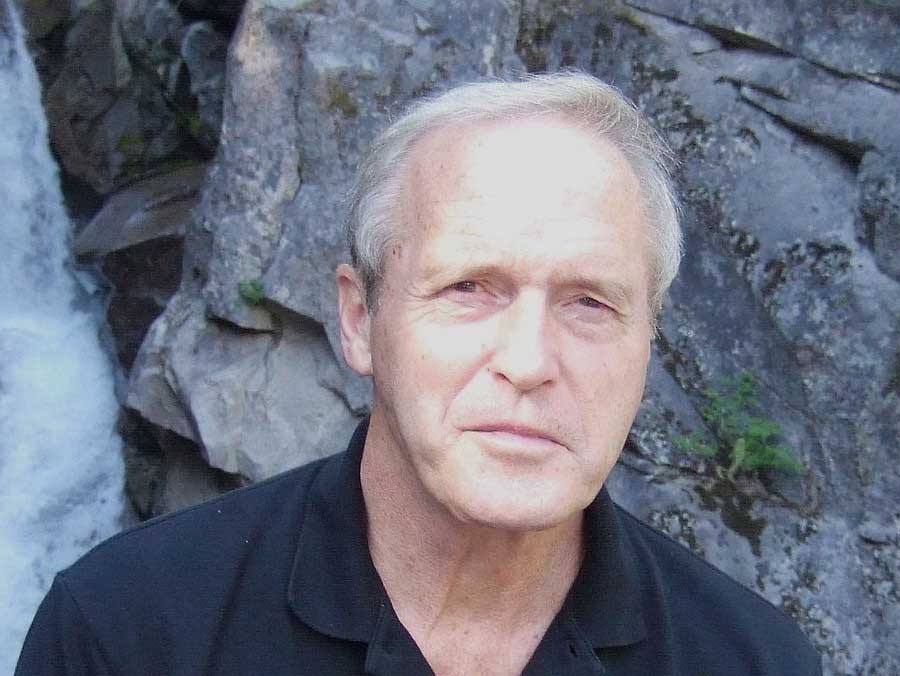Huddle ponders Steve Earle, Appalachian angst and young love
Award-winning author David Huddle
Kicking off the JSC Spring Author Series, award-winning writer David Huddle presented a trifecta of poetry, nonfiction and fiction, as he explored themes such as badassery, death, music, family, Alzheimer’s and drugs.
During the March 18 event, the multi-dimensional Huddle read from his poetry collection “Black Snake at the Family Reunion,” his upcoming book “The Faulkes Chronicle,” and his essay, “The Low-Down High Art of Steve Earle’s ‘Copperhead Road.’”
“Copperhead Road was tribal . . . Copperhead road is the opposite of a feel-good sing along. It’s an outlaw battle hymn; it’s the national anthem of the hillbilly nation,” read Huddle, a native of Appalachian Virginia. The author described the moonshine-cowboy song that inspired his essay: “There came along that instrumental break, where Steve kicks off with that barbaric yowl. The kind of noise a young warrior might make leading a charge of his comrades into a hail of gunfire,” he read.
“I got the chills,” read Huddle about the guitar and bagpipes. “I understood that I had been called, been shocked, and it amused me that some deeply primitive part of my spiritual innards . . . must have come down through the generations from Scottish ancestors 200 years back in highlands, had answered the call to battle . . . I was ready to stand up and start shooting, swinging my sword,” he read.
Huddle’s “Copperhead” essay challenged listeners to distinguish between good and evil, and what is responsible for good art and a healthy spirit. How bad do you want to be?
How good? Obsession and vicarious living through song was Huddle’s tool to grab the audience.
Huddle related illegal moonshine to the “marijuana marketer,” and LSD artists. “It’s what I believe, drugs including alcohol will kill your art,” said Huddle.
The author couldn’t deny that the now-sober Steve Earle created better art when he was drunk and high. “Steve, bless his heart, really has done enough work for the devil for one lifetime . . . what he’s given us already is more than enough,” said Huddle.
From his “Blacksnake” collection Huddle read poems, “This Morning,” “Burned Man,” “Aloft,” and “The Stile.”
“Stile” imagines parents falling in love many years before their children are born. Huddle read through the voice of future offspring. “My brothers and I were specks of cosmic/dust floating far above the thistles, clover,/alfalfa, and wild strawberries that grew/in that field-no bodies, brains, or spirits,” read Huddle. “My brothers and I kept/ our watch, drifting closer each time my father/approached the stile to find her on the porch,/waiting in the wicker rocker. Her half-closed/eyes saw him flying to her. That’s when they/must have felt us waiting out there in time,” he read.
After the reading, Huddle answered audience questions.
One JSC students wondered which poems were most difficult to write emotionally. “Some of the ones seem happy, seem not difficult at all until you read them in public,” said Huddle. “And ‘The Stile’ is one that I don’t think was hard to write, but I’ve read it a few times in public and whenever I do come to that ending I get a little teary with it,” said Huddle. “And maybe the one about ‘Aloft’ is pretty hard with my mother’s Alzheimer’s, that one was difficult,” he said.
Family strife and love was another hook that grabbed the audience.
Another JSC student asked if writing about deceased loved ones continued relationships. “In fact, it isn’t the end even if you don’t write; you still have a relationship with that person. I have a couple of good friends who have died in the last four or five years that I still have conversations with them. And I knew them well enough that I could say what I would say and I would know what they would say in response so they’re still with me,” said Huddle. “I think writing about people really is a way of keeping company with them and bringing them back,” he said.
Huddle is teaching Form and Theory of Fiction this semester and has been working alongside B.F.A. students on their senior theses in fiction.
Travis LeClair joined the Basement Medicine staff in Spring 2014, assuming the position of staff reporter.



